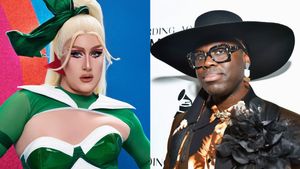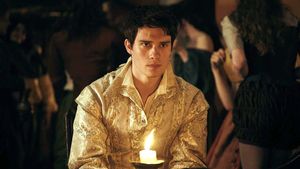Editor's note: Hannah Ryan is an associate producer for CNN International. The views expressed in this commentary are her own. Read more opinion on CNN.
(CNN) — It’s Oscars season and “Barbie” is dominating the discourse.
Since the nominations were announced on Tuesday, fans of Greta Gerwig’s pink-tinged fantasy have been taking to social media to make it clear that they’re not happy that Gerwig and star Margot Robbie didn’t bag nominations for their respective categories in best director and best actress (though both did receive nominations, Robbie as a producer and Gerwig for best adapted screenplay).
The outrage at their perceived omissions is so widespread that even former US Secretary of State Hillary Clinton has weighed in. Many feel that the fact that Ryan Gosling is nominated for best supporting actor for his performance as Ken, Barbie’s lovable-but-dim boyfriend, is reflective of the patriarchal power of the world that the film supposedly rallies against.
But here’s the thing; “Barbie” is neither smart enough nor interesting enough to be inspiring this level of uproar. When I first heard about “Barbie,” I thought I would like it. I’m a huge fan of Gerwig’s other work, especially “Frances Ha” and “Little Women,” the latter of which I am convinced is the greatest example of a perfect filmic adaptation of a book (and for which Gerwig received a nomination for best adapted screenplay, though notably not for best director).
Of “Barbie,” I thought it might be, if nothing else, a fun time at the movies. What I found, instead, was a deeply disappointing blockbuster that offered audiences a watered-down version of feminism and which often felt like a vehicle for multimillion dollar toy company Mattel to poke fun at itself whilst using the movie as a shield from real criticism. (The distributor of “Barbie” and CNN share a parent company).
There is nothing radical about the feminism that “Barbie” puts forward. In fact, I feel that it actually lets patriarchy off the hook far too easily by suggesting – through the proxy of Ken – that men’s misogyny comes from a place of idiocy rather than malice. By depicting Ken as a dumb, hapless figure, “Barbie” makes misogyny a laughing matter, instead of what it often is – a matter of life and death for women.
“Barbie” functions only as a palatable crowd-pleaser and not as an intelligent critique of sexism. In the film, audiences have a laugh at bumbling Mattel executives. But the company will continue to make a fortune from a doll that, at least at its inception, helped to uphold unrealistic beauty standards for a generation of girls and women.
It’s also important to remember that “Barbie” has most certainly not been ignored by the Academy Awards’ members. It has eight nominations – which is far more than many of 2023’s other women-directed films got. While “Barbie” achieved cultural phenomenon status last year, other films that took a more complicated approach to womanhood were shut out of the Oscars and the mainstream awards circuit completely.
Sofia Coppola’s “Priscilla” – a claustrophobic portrait of Priscilla Presley’s marriage to Elvis – and Molly Manning Walker’s “How to Have Sex” – a devastating story of a girls’ vacation that ends in tears – received no attention from the Academy. Nor did Ava DuVernay’s groundbreaking film “Origin.” All offer far more fascinating explorations of women’s lives and interior thoughts than “Barbie,” and all are defined by their exceptional direction and their standout performances by two rising stars in Cailee Spaeny and Mia Mckenna-Bruce, as well as veteran Aunjanue Ellis-Taylor.
“Origin” is a fascinating work inspired by Pulitzer Prize-winning author Isabel Wilkerson’s book, “Caste: The Origins of Our Discontents.” “Priscilla” was directed by one of the most famous and accomplished female directors of the 21st century and “How to Have Sex” won the prestigious prize of “Un Certain Regard” at the Cannes Film Festival. Yet all were totally overlooked by the Oscars.
And, ironically, the discourse swirling around Gerwig and Robbie’s supposed lack of recognition has overshadowed a truly historic moment. Lily Gladstone is up for best actress for her role in the Martin Scorsese epic “Killers of the Flower Moon” – making her the first Native woman of American descent to be nominated in the category.
Yet, in most conversations about the Oscars in recent days, Gladstone’s achievement has become something of a footnote. Energy that could be better expended by highlighting the watershed moment for Gladstone and for Native women of American descent has instead been poured into indignation over Gerwig and Robbie missing out.
As for the categories that Robbie and Gerwig were not considered for, I don’t think it’s unfair to argue that they might’ve not landed the nominations because neither have put forward their best work here. Gerwig’s direction in “Barbie” is grand in scope, no doubt, but it’s her impeccably observed depiction of a strained mother-daughter relationship in 2017’s “Lady Bird” that broke my heart and cemented her as an astute filmmaker.
Robbie does a fine job as the titular doll in “Barbie,” but she is far more affecting in the few minutes of screentime she has in Wes Anderson’s recent “Asteroid City” and far funnier in “The Wolf of Wall Street” – where her excellent comedic timing comes across much better than it does in the hollow world of “Barbie.”
With just over a month to go before the ceremony itself, don’t expect the furor over “Barbie” to go away anytime soon. But while some of its fans flood the internet with anger, it might be worth seeking out some of 2023’s other female-directed films, from A.V. Rockwell’s “A Thousand and One” to “Priscilla” and “Origin” and “How To Have Sex,” all of which offer far more nuanced and complex studies of women and all of which haven’t had so much as a whiff of winning a seat at the Oscars’ table.
The-CNN-Wire
™ & © 2024 Cable News Network, Inc., a Warner Bros. Discovery Company. All rights reserved.

Video Source: Advocate Channel


















































